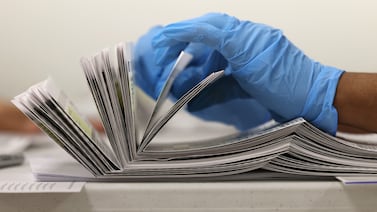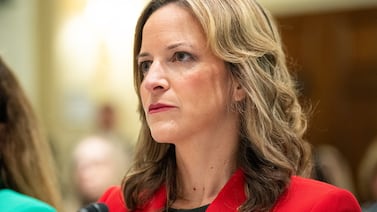Votebeat is a nonprofit news organization reporting on voting access and election administration across the U.S. Sign up for Votebeat Wisconsin’s free newsletter here.
Madison’s clerk, Maribeth Witzel-Behl, has resigned, the city announced Monday, as the city and state continued to look into how she and her staff lost track of nearly 200 ballots that never got counted in November.
Witzel-Behl, who took the post in 2006, gained wide recognition for running elections in the state’s second largest city during the pandemic and multiple presidential elections. In all, she oversaw more than 60 elections.
But her reputation took a blow in the November 2024 election, when 193 ballots from two polling stations went missing on Election Day and never got counted. Clerks and the Wisconsin Elections Commission have criticized her for failing to promptly inform state and city officials about the issue.
“On behalf of City of Madison residents, I want to extend my gratitude to Maribeth for her commitment and dedication to public service,” Madison Mayor Satya Rhodes-Conway said.
Witzel-Behl was placed on leave in March, with Mike Haas, the city attorney and former commission administrator, acting as clerk in the interim. It’s unclear who will replace Witzel-Behl; Haas previously told Votebeat he does not want the job permanently. The city is undertaking a national search, officials said.
“It has been a pleasure to serve the City for 20 years,” Witzel-Behl said in a brief resignation letter to the mayor. “I wish nothing but the best for you, the City Clerk’s Office, and the City.”
In addition to ongoing city and state investigations, the November error has also led to legal action, with a liberal election-law group seeking $34 million in damages on the grounds that voters were disenfranchised.
In its probe, the Wisconsin Elections Commission found that mistakes by the clerk’s office began well before Election Day, including printing poll books for the two polling sites earlier than recommended by the commission.
Had the poll books been printed later, they would have automatically indicated that certain ballots had been returned, making it clearer to poll workers on Election Day that some ballots had been received but not counted.
Clerk’s staff found the first batch of ballots — 68 in total — in a previously unopened courier bag in the clerk’s office on Nov. 12, while Dane County was in the middle of certifying the election.
There are conflicting accounts of what happened next: An unidentified Madison election worker claimed that the county was informed about the ballots that day, but Dane County Clerk Scott McDonell has denied that. Witzel-Behl, who, according to records obtained by Votebeat, was on vacation for much of the time following Election Day, didn’t follow up with the county, and those ballots were never counted.
A second batch of 125 ballots was discovered in the clerk’s office on Dec. 3. However, staff didn’t relay that information to the Wisconsin Elections Commission until Dec. 18, well after the state certified the election. The commission then notified Haas about the error, who relayed the news to the mayor’s office — which is when both learned of the problem for the first time.
Facing growing scrutiny, Witzel-Behl proposed procedural changes, including requiring clerk’s staff to verify all election materials received on election night and ensuring that each polling place receives a list of the absentee-ballot courier bags it handles to prevent any from being overlooked.
Those measures were implemented fully in the Wisconsin Supreme Court election, which she was on leave for. The city apparently didn’t have any significant oversights in that election. City officials say they’re still refining the procedural changes.
Alexander Shur is a reporter for Votebeat based in Wisconsin. Contact Alexander at ashur@votebeat.org.



